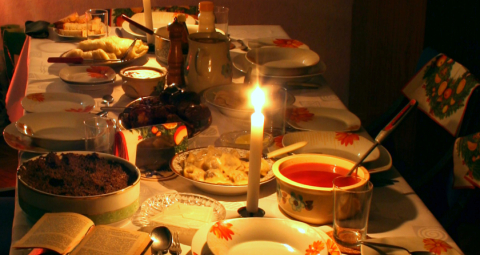December 23 | ![]() 0 COMMENTS
0 COMMENTS ![]() print
print

Enjoying the best of both worlds with a Polish-Scottish Christmas
Ian Dunn sings the praises of a Scottish-Polish Christmas—though perhaps not for the waitsline
I am extremely blessed to be married to a Polish woman and a big part of that blessing is the chance to experience high days and holidays in a totally new way.
However, the miserly Scottish bit of my soul did complain quite a bit when I discovered that, in addition to being visited by Santa this Christmas, our beloved children would also be visited by the Polish Santa on December 6.
Mikolaj (Polish for St Nicholas) sneaks in on the Eve of his feast day and places gifts under children’s pillows. This has proven very popular in my house to be fair, and my three-year-old’s demands to wear her ‘Mikolaj pyjama’ have been a constant theme of this advent.
Negotiation
As part of the ongoing cultural negotiation with which all those with a spouse from a different culture will be familiar we have also agreed that Scottish Santa will appear on Christmas Eve.
I was surprised to learn that, in Poland, children get visited by a mysterious ‘Star’ which brings them gifts on Christmas Eve as well. But one thing I have learned from Poles is that if something is worth doing, it’s worth doing several times. These, after all, are a people that will celebrate both their birthday and their ‘name day’, a very similar but entirely separate celebration, each year.
But perhaps the biggest struggle of all at Christmas, even in a Polish-Scottish Union, is the damage to my waistline and blood pressure by having two very similar but entirely separate celebrations in two days.
Christmas Eve
Not for the Poles the Christmas Day Turkey and sprouts, for them the big day is Christmas Eve. So we do both. And a Polish Christmas Eve is not to be sniffed at. Many will fast during the day itself, and not sit down to eat until the first star, representing the star of Bethlehem has appeared in the sky.
The meal begins with the breaking of the Opłatek—unleavened wafer made of flour and water embossed with a religious image. Every person gets one and breaks a piece of it with everyone else, telling them something happy they wish for them in the year to come.
One place at the table will be empty just in case there should there be an unexpected visitor. If someone actually turns up at the door, hosts should feed this guest and give them shelter. In the words of the old Polish saying—that ‘a guest at home is God at home.’
Tradition
As for the meal itself, there are 12 dishes on the table, one for each month of the year and everyone should try every dish.
Meat is not served on Christmas Eve in a Polish house. On the table, you will find fish, soups and various dishes made of potatoes, sauerkraut and mushrooms. The most common ‘Christmas’ fish is carp.
Before Christmas, many Polish markets will sell live carp which can be taken home and kept alive in the bath until it’s killed on Christmas Eve. This, thankfully, is one Polish tradition I’ve managed to resist.
After the meal, the children open presents and everyone goes to Midnight Mass.
Family
Though I would not admit this at home, at this stage I actually prefer many of the Polish Christmas traditions to our own here in Scotland.
The structure of them, and deeper reverence for family and love, are a stark contrast to the festival of consumption that all too often marks Christmas here.
The laying of a place of the stranger, the breaking of bread with loved ones and wishing them good things—these are physical acts that remind us why we are celebrating and why it matters. I heartily recommend you try them this Christmas.
Merry Christmas and Na Zdrowie!










